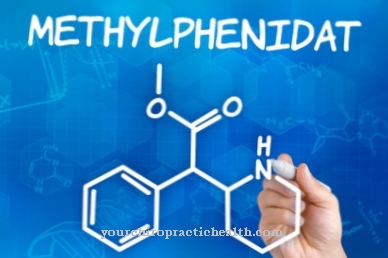Piperine is an acid amide alkaloid and, as the main substance of pepper, not only has pungent properties. It is also helpful because it has a beneficial effect on biological processes in the body.
What is piperine?

The alkaloid piperine ensures the spiciness of the pepper and is found in all types of pepper. White pepper is particularly rich in piperine.
Scientific research has shown that piperine promotes the absorption of nutrients. It should also inhibit inflammation and tumor growth and have an antibacterial effect. However, in interaction with certain drugs, negative effects can occur.
Pharmacological effect
Piperine was identified as a bioenhancer in the USA in 1979. Doctors had previously found that the effect of lungwort against asthma could be increased when taken at the same time as pepper. The so-called bioenhancers have amazing properties: They can improve the absorption of substances via the intestine, but they can also inhibit the breakdown of substances in the intestines and the liver.
Piperine has a positive effect on the absorption of most vitamins and numerous amino acids. This amazing ability has so far only been discovered in plants. Piperine also has a positive effect on the ability to cross the blood-brain barrier and reduces the defense mechanisms of pathological tissue or tumor tissue. This means that taking it will reduce the likelihood of a tumor getting bigger. Piperine has this in common with almost all bioactive substances.
Medical application & use
The medical knowledge of bioactive substances is based on Ayurvedic teaching, which comes from India. With bioenhancers like piperine a wide variety of metabolic processes can be favored and vital mechanisms can be maintained. This means that they can all increase the availability of vitamins, nutrients and active ingredients to the target structures.
Many nutrients are not used in the toxin centers of our body, the liver and the intestines, but are excreted or converted. The bioactive substances can ensure that they are almost completely utilized and that they reach their destinations more easily.
So that the bioactive effect of pepper is not lost, the spice must be stored in a dry, cool and, above all, dark place. If pepper is exposed to light for too long, piperine is converted into isochavicine, i.e. it decomposes.
Piperine has a direct effect on our health. By blocking the transport of calcium, piperine can lower blood pressure. It also has antioxidant properties, i.e. it can neutralize free radicals and thus protect against various diseases. In addition, it can increase the effectiveness of some drugs by inhibiting the biotransformation of the enzymes they contain. The general activating substance can even contribute to a lightening of the mood and shows success in rheumatism patients.
It is not for nothing that piperine in its pure form, namely as pepper, has been a standard medicine in traditional Chinese medicine for thousands of years. There are many neuroprotective substances. Piperine is one of them. Their nerve-protective effect has also been confirmed in animal experiments.
Risks & side effects
Piperine protects against degenerative diseases of the brain and strengthens the nerve cells. The greatest damage to nerve cells is caused by oxidative stress. In these processes, the mitochondria, the power plants of the cell, are at the center of the action. Piperine can stabilize the function of the mitochondria and thus has a neuroprotective effect. So it happens that neuroprotective substances such as piperine are also used in addition to therapy for stroke patients, Parkinson's, multiple sclerosis and Alzheimer's disease.
Due to its numerous positive properties, piperine is increasingly used as a dietary supplement. It is also said to have a weight-reducing effect, but fat loss also depends on many other factors and cannot be influenced by piperine alone.
The substance has even been approved as a tuberculosis drug in India since 2009. Our common antibiotics also often contain piperine, with the positive effect that other constituents can be dosed less.
In Europe and the USA, however, piperine is less important as a medicinal substance, as there is more emphasis on products from the pharmaceutical industry. Still, pepper is a natural remedy and can increase wellbeing. For thousands of years it has been used in Indian medicine for stomach ailments, bronchitis, insomnia and even cholera. In Ayurvedic medicine, piperine is also known as a pain reliever.
In conjunction with nicotine, alcohol or drugs, piperine can have very negative effects. If you live healthy, piperine can certainly boost your fat burning. The antibacterial, antioxidant, and antimicrobial properties of black pepper are undisputed.






.jpg)




















